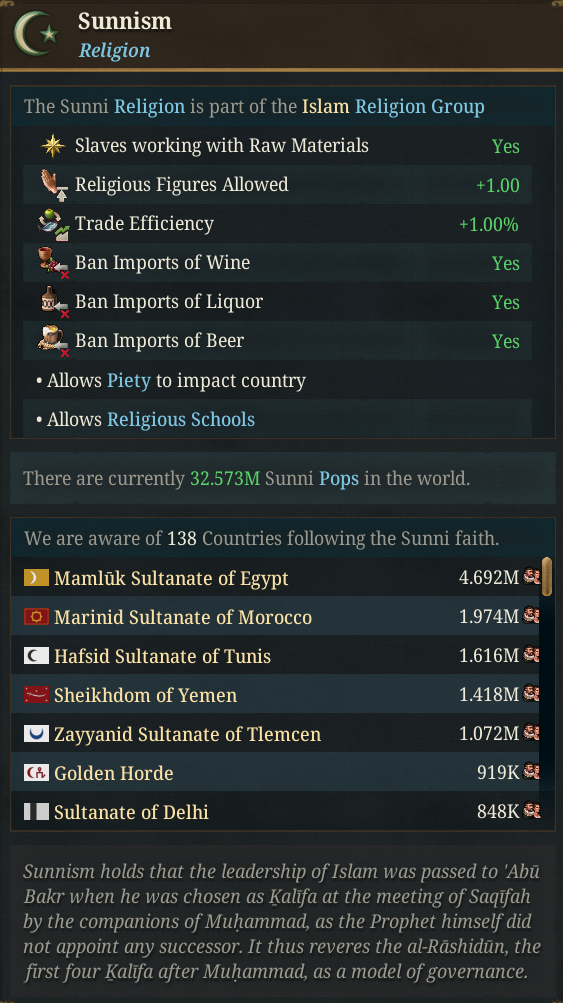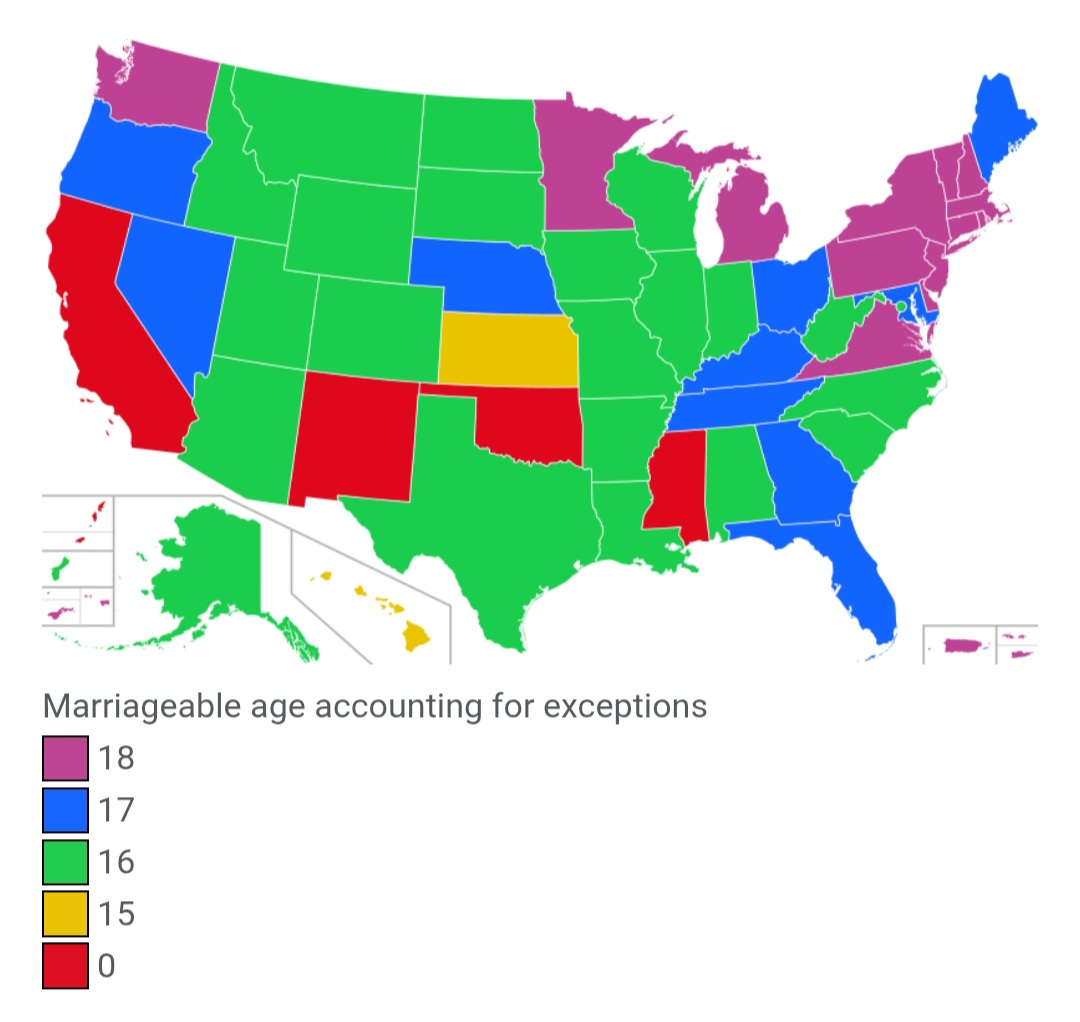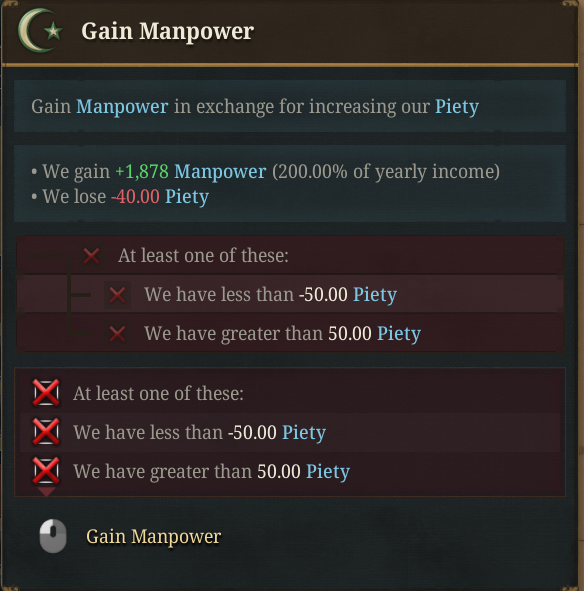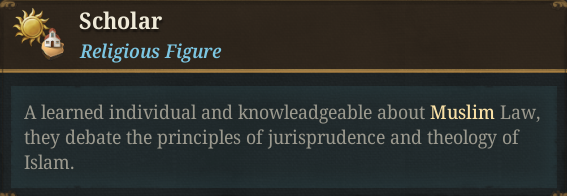Hello, and welcome to another Tinto Talks, the happy Wednesdays where we talk about Europa Universalis V!
Today, we will discuss the mechanics of Islam. In EUV, it is considered a Religious Group, as Christianity or Buddhism:

As usual, please consider all UI, 2D, and 3D art WIP.
As you see, three Religions compose the group: Sunnism, Shiism, and Ibadism:



They share similar features, and then inside them is where we make the religious differentiation:

The first mechanic is Schools, an old companion from EU4, but that has been reworked in EU5:

Muslim countries start with a School, which gives some modifiers:

As you can see, each School has a different view of the other. This is important because you can invite Scholars of Schools that are available for your branch of Islam, and also don’t have a negative opinion of your chosen School.
Because, yes, the old EU4 Scholars are also present in EU5, but they’re now inside a new category, the ‘Religious Figures’, which gives some more flexibility on how to use them:


Scholars are now characters that can travel through the Islamic world and be invited to work for you:

This unlocks the possibility to change the Main School of your country to that of the Scholar:


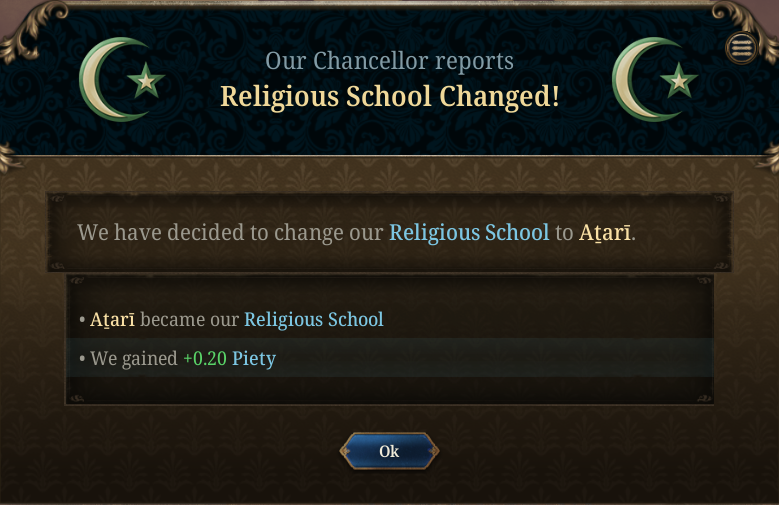
In total, we have this number of schools, with some schools being available to more than one religion:
The main currency for the religion is Piety, again a returning concept from EU4. Piety can go from a value of -100 to +100 (representing Mysticism or Legalism respectively), giving scaling benefits to the country depending on the direction.

Piety will be modified towards one extreme or the other mainly through events, although there are also some ways of adding a passive monthly tendency towards one direction, including privileges and cabinet actions. Another important aspect to mention regarding piety is the fact that to be able to invite a Scholar belonging to any of the Sufi schools, the country must already be leaning towards Mysticism.
There are a couple of actions in which the country can spend its piety to gain some benefits. A country can exchange piety for either stability or manpower, and both actions require being at 50 piety towards either direction, and move the value 40 towards the center.


There is also the option to perform a pilgrimage to one of the Holy Sites, as long as they are owned by the country, an ally, or someone with good relations. Performing a pilgrimage will give a small increase in piety, as well as sending the ruler on a holy journey.

Another important aspect to mention is the fact that Muslim countries have access to some unique laws and policies:



Implementing the Sharī'ah Law will unlock an extra law, the Sharī'ah Jurisprudence, with policies dependent on the country’s main school.

Finally, there are a couple of unique buildings available for Islamic countries:


And that’s all for today! Tomorrow is Thursday, which means that we will publish a new ‘Behind the Scenes’ video, and on Friday, we will take a look at the Ottomans and the Rise of the Turks situation!
And also remember, you can wishlist Europa Universalis V now! Cheers!
Today, we will discuss the mechanics of Islam. In EUV, it is considered a Religious Group, as Christianity or Buddhism:

As usual, please consider all UI, 2D, and 3D art WIP.
As you see, three Religions compose the group: Sunnism, Shiism, and Ibadism:



They share similar features, and then inside them is where we make the religious differentiation:

The first mechanic is Schools, an old companion from EU4, but that has been reworked in EU5:

Muslim countries start with a School, which gives some modifiers:

As you can see, each School has a different view of the other. This is important because you can invite Scholars of Schools that are available for your branch of Islam, and also don’t have a negative opinion of your chosen School.
Because, yes, the old EU4 Scholars are also present in EU5, but they’re now inside a new category, the ‘Religious Figures’, which gives some more flexibility on how to use them:


Scholars are now characters that can travel through the Islamic world and be invited to work for you:

This unlocks the possibility to change the Main School of your country to that of the Scholar:



In total, we have this number of schools, with some schools being available to more than one religion:
- 10 Sunni:
- Ḥanafī
- Ḥanbalī
- Mālikī
- Shāfi'ī
- Ẓāhirī
- Ash'arī
- Māturīdī
- Aṯarī
- Mu'tazilī
- Wahhābī
- 11 Sufi - Both for Sunni and Shia, except 3:
- Bektashi
- Chishtī (only for Sunnism)
- Ḵalwātī
- Mevlevi
- Naqshbandī (only for Sunnism)
- Qādirī (only for Sunnism)
- Ṣafavī
- Shāḏilī
- Suhrawardī
- Īsāwī
- Dīn-i Ilāhī
- 8 Shia:
- Ismā'īlī
- Ja'farī
- Zaydī
- Imāmīya
- Nizārī
- Musta'lī
- Alevism
- 'Alawī
- 1 Ibadi:
- Ibadi - only for Ibadi
- It also has access to all the Sunni and Shia schools, but not the Sufi ones
The main currency for the religion is Piety, again a returning concept from EU4. Piety can go from a value of -100 to +100 (representing Mysticism or Legalism respectively), giving scaling benefits to the country depending on the direction.

Piety will be modified towards one extreme or the other mainly through events, although there are also some ways of adding a passive monthly tendency towards one direction, including privileges and cabinet actions. Another important aspect to mention regarding piety is the fact that to be able to invite a Scholar belonging to any of the Sufi schools, the country must already be leaning towards Mysticism.
There are a couple of actions in which the country can spend its piety to gain some benefits. A country can exchange piety for either stability or manpower, and both actions require being at 50 piety towards either direction, and move the value 40 towards the center.


There is also the option to perform a pilgrimage to one of the Holy Sites, as long as they are owned by the country, an ally, or someone with good relations. Performing a pilgrimage will give a small increase in piety, as well as sending the ruler on a holy journey.

Another important aspect to mention is the fact that Muslim countries have access to some unique laws and policies:



Implementing the Sharī'ah Law will unlock an extra law, the Sharī'ah Jurisprudence, with policies dependent on the country’s main school.

Finally, there are a couple of unique buildings available for Islamic countries:


And that’s all for today! Tomorrow is Thursday, which means that we will publish a new ‘Behind the Scenes’ video, and on Friday, we will take a look at the Ottomans and the Rise of the Turks situation!
And also remember, you can wishlist Europa Universalis V now! Cheers!



